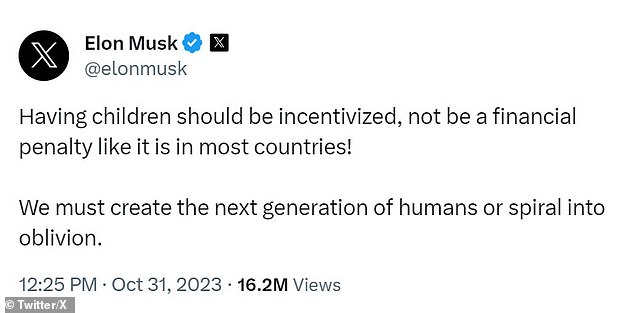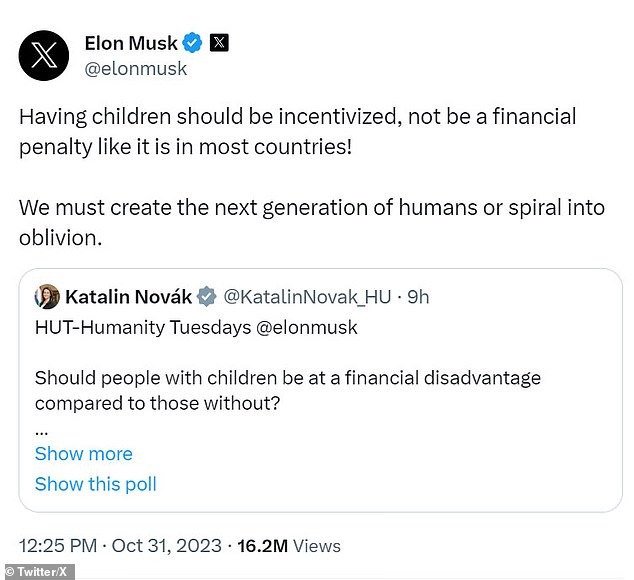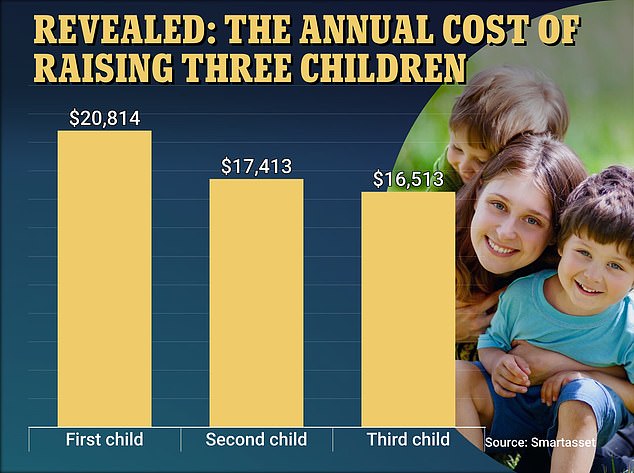Father-of-11 Elon Musk says parents should be ‘incentivized’ to have children to ‘create the next generation of humans or spiral into oblivion’
Elon Musk says people should be encouraged to have children to fuel population growth around the world.
The billionaire father of 11 children warned that humanity will be doomed to “oblivion” if birth rates fall.
‘Having children should be encouraged and should not be a financial punishment, as is the case in most countries!’ Musk wrote on X, formerly Twitter, which he owns.
“We have to create the next generation of people or we will end up in oblivion,” he added.
The statement came in response to Katalin Novak, the president of Hungary, posting a poll on the site asking “should people with children be at a financial disadvantage compared to people without children?”

Tesla magnate Elon Musk has eleven children and has advocated a pro-natal policy

Musk wrote on the social media platform X, which he owns, that more needs to be done to encourage people to have children
“In Hungary we want people with children to have a financial advantage,” Novak added.
It comes as Hungary recently announced a series of pro-natalist policies including tax exemptions for women with more than four children, loans written off after couples have three or more children, help for first-time buyers with children and access to government-owned fertility clinics.
Musk himself has 11 children: Techno Mechanicus, Griffin, Vivian, Kai, Saxon, Damian, X, Nevada, Exa and twins whose names are not yet publicly known.
The Tesla mogul has previously made pro-natalist comments, proclaiming “if people don’t have more children, civilization will crumble,” during a factory visit in 2021, Wired reported.
He later reiterated at a 2022 Wall Street Journal event: “The fundamental constraint is labor, there are not enough people.
‘I cannot emphasize this enough. One of the greatest risks to civilization is the low birth rate.”
The US is experiencing a decline in birth rates and the cost of raising three children now leaves the average American family paying back $54,000 a year – while costs in the country’s most expensive places are as high as $90,000.
Typically, prices for childcare, housing, food, medical expenses and transportation are highest for the firstborn, with a national average of $20,814 per year.


Musk’s message was in response to the reaction of the president of Hungary, who posted a poll on the site with questions about child policy
This drops to $17,413 per year for the second child, before falling even further to $16,513 for the third child.
SmartAsset examined the costs of food, child care, health care, additional housing and other necessities in 381 metropolitan areas when a family with two working adults adds one, two or three children to their budget.
Ann Arbor, Michigan, is the most expensive place to raise children in the US, according to the study, mainly due to exceptionally high child care prices.
Raising three children under the age of four in the city will earn the average family about $91,063 – with childcare costs rising to as much as $22,000 per year per child.
Raising the first child costs $31,670, according to SmartAsset, but drops to $28,924 for the third – a percentage drop of almost 9 percent.
The San Francisco area is notoriously expensive, especially when it comes to real estate.

Normally, prices for childcare, housing, food, medical costs and transportation are highest for the firstborn

The third child costs parents about 20 percent less than the first, according to a new study from financial technology company SmartAsset

Ann Arbor, Michigan, is the most expensive place to raise children in the US, according to the study, mainly due to exceptionally high childcare prices
The San Francisco-Oakland-Berkeley metro area is the most expensive place to raise one child at $35,647, according to the study.
It comes after a landmark study earlier this year found that childcare costs across the country have risen by 220 per cent in three decades – well above the general rate of inflation.
The skyrocketing costs have driven many parents out of the workforce, the educational charity Annie E. Casey Foundation found, with families facing an effective geographic “lottery” with interstate child care costs reaching thousands of dollars.
Rising child care costs are partly due to more parents working, which increases demand, and the centers themselves being underfunded and under-resourced.
Childcare businesses survive on margins that are typically less than 1 percent, the report said.
